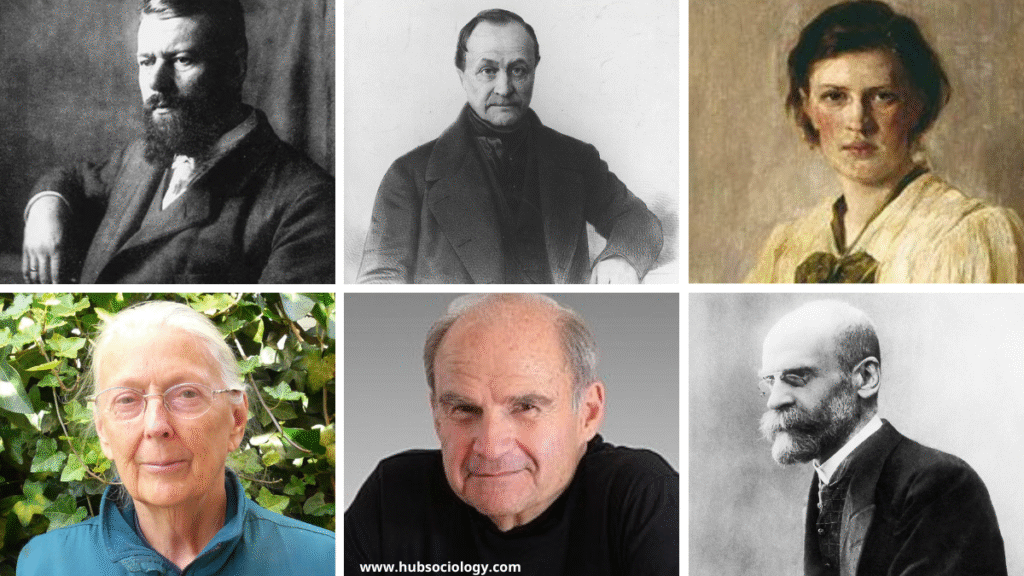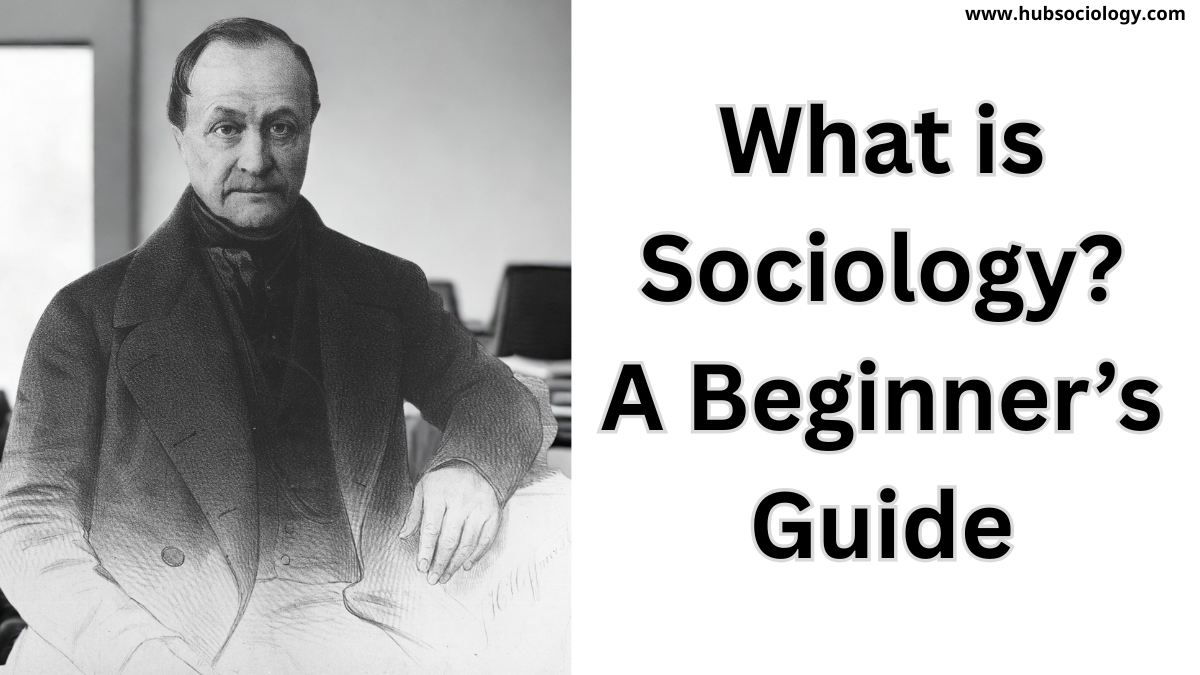Introduction on What is Sociology
Sociology is the scientific study of society, human social relationships, and the structures that shape our lives. It looks at how people interact within organizations, cultures, and groups and how these interactions affect social change, behavior, and beliefs. As a discipline, sociology helps us understand the complexities of social life, from small-scale personal interactions to large-scale global phenomena.
For beginners, sociology offers a lens through which we can critically analyze the world around us. It challenges common assumptions, explores social inequalities, and provides insights into how societies function. This article will introduce key concepts, theories, and the importance of sociology in understanding human behavior and social structures.

Table of Contents
Defining Sociology
The term sociology comes from the Latin word socius (companion) and the Greek word logos (study), meaning the study of companionship or social relations. Many people consider the French philosopher Auguste Comte (1798–1857) to be the “founder of sociology” since he popularized the term and promoted a scientific method of examining society.
Sociology differs from other social sciences like psychology (which focuses on individual behavior) or economics (which studies production and consumption) by emphasizing social patterns, institutions, and collective behavior. It asks questions such as:
- How do societies maintain order?
- Why do social inequalities exist?
- How do cultures shape our identities?
- What causes social change?
Key Concepts in Sociology
To grasp sociology, it’s essential to understand some foundational concepts:
1. Society and Social Structure
A group of people who share a common culture, institutions, and geographic area are referred to as a society. The structured arrangement of social ties and societal institutions, such as the family, government, and educational system, is known as social structure. These structures influence behavior by providing norms and roles that guide interactions.
2. Culture
A society’s beliefs, values, customs, symbols, and tangible artifacts are all part of its culture. It shapes how people perceive the world and interact with one another. To comprehend diversity and social cohesiveness, sociologists research cultural distinctions, subcultures, and cultural change.

3. Socialization
The lifelong process by which people pick up social norms, attitudes, and behaviors is known as socialization. While secondary socialization takes place later (via friends, schools, and the media), primary socialization happens throughout childhood (through family). This process helps maintain social order by transmitting culture across generations.
4. Social Institutions
These are established systems (e.g., family, education, religion, economy, government) that fulfill essential societal needs. Each institution has specific functions:
- Family – Provides emotional and economic support.
- Education – Transmits knowledge and socializes individuals.
- Religion – Offers moral guidance and community bonding.
- Economy – Organizes production and distribution of goods.
- Government – Maintains laws and order.
5. Social Stratification and Inequality
Societies are often divided into hierarchical layers based on factors like class, race, gender, and age. Inequalities in opportunities, power, and income are caused by social stratification. Sociologists study:
- Class – Economic divisions (upper, middle, lower class).
- Race and Ethnicity – Socially constructed categories affecting privilege and discrimination.
- Gender – Social norms and disparities between men and women are referred to as gender.
6. Deviance and Social Control
Deviance refers to behaviors that violate societal norms. Cultural and historical definitions of “deviant” differ. Social control (through laws, norms, and sanctions) ensures conformity. Sociologists examine why deviance occurs and how societies label and punish it.
7. Social Change
Social movements, cultural changes, and technical breakthroughs all contribute to the evolution of societies. Sociology explores the causes and consequences of change, such as industrialization, globalization, and digital communication.
Major Sociological Theories on What is Sociology
Sociologists use different theoretical perspectives on What is Sociology to analyze society. The three main paradigms are:
1. Functionalism (Structural Functionalism)
- Key Thinkers: Émile Durkheim, Talcott Parsons
- Focus: Society as a complex system where institutions work together to maintain stability.
- Example: Education prepares individuals for jobs, contributing to economic stability.
2. Conflict Theory
- Key Thinkers: Karl Marx, Max Weber
- Focus: Society is shaped by power struggles and inequalities between groups (e.g., rich vs. poor).
- Example: Capitalism exploits workers for profit, creating class conflict.
3. Symbolic Interactionism
- Key Thinkers: George Herbert Mead, Herbert Blumer
- Focus: Micro-level interactions; how people create meaning through symbols (language, gestures).
- Example: A handshake symbolizes trust in business interactions.
Other important theories include:
- Feminist Theory – Examines gender inequalities.
- Postmodernism – Challenges traditional social structures in a globalized world.
Why Study Sociology?
Sociology is more than an academic discipline—it helps us navigate and improve society. Here’s why it matters:
1. Understanding Social Issues
Sociology provides insights into poverty, crime, racism, and education disparities, helping policymakers design better solutions.
2. Critical Thinking
It encourages questioning societal norms and recognizing biases in media, politics, and culture.
3. Career Applications
Sociologists work in education, social work, law, marketing, and public policy, using research to address real-world problems.
4. Promoting Social Justice
By exposing inequalities, sociology supports movements for gender equality, racial justice, and workers’ rights.
Conclusion on What is Sociology
Sociology offers a powerful framework for understanding human behavior, social structures, and global changes. By studying sociology, we gain the tools to critically analyze the world, challenge injustices, and contribute to a more equitable society.

Whether you’re a student, activist, or curious individual, sociology provides valuable perspectives on how societies function—and how they can be transformed for the better.
Do you like this this Article ? You Can follow as on :-
Facebook – https://www.facebook.com/hubsociology
Whatsapp Channel – https://whatsapp.com/channel/0029Vb6D8vGKWEKpJpu5QP0O
Gmail – hubsociology@gmail.com
Topic Related Questions on What is Sociology
5-Mark Questions on What is Sociology (Short Answers)
- Define sociology and explain its importance.
- Who is considered the father of sociology, and why?
- What is socialization? Briefly explain its types.
- Differentiate between society and community.
- Name the three major sociological perspectives and their key thinkers.
- What is culture in sociology? Give two examples of cultural norms.
- Define social stratification and list its types.
- What is the role of social institutions in society?
- Explain the concept of deviance with an example.
- How does sociology differ from psychology?
10-Mark Questions on What is Sociology (Brief Explanations/Essays)
- Discuss the scope of sociology as a social science.
- Explain the functionalist perspective in sociology with an example.
- How does conflict theory explain social inequality? Provide examples.
- Describe the process of socialization and its agents.
- What are the key differences between primary and secondary groups?
- Discuss the impact of social change on modern society.
- Explain symbolic interactionism and its relevance in everyday life.
- How do social institutions like family and education contribute to society?
- What is the relationship between culture and society?
- Discuss the concept of social control and its mechanisms.
15-Mark Questions on What is Sociology (Detailed Essays)
- Define sociology. Discuss its nature and significance in understanding social issues.
- Compare and contrast the functionalist and conflict perspectives in sociology.
- Explain Karl Marx’s theory of class struggle and its relevance in today’s society.
- Discuss the role of socialization in shaping an individual’s personality and behavior.
- What is social stratification? Analyze its causes and consequences in modern societies.
- How do social institutions maintain stability in society? Discuss with examples.
- Examine the impact of globalization on culture and social structures.
- Discuss the feminist perspective in sociology and its critique of traditional theories.
- How does symbolic interactionism explain human interactions in society?
- “Sociology helps in solving social problems.” Justify this statement with examples.
Additional Application-Based Questions on What is Sociology
- Case Study: Analyze how social media influences socialization among teenagers.
- Research-Based: Conduct a small survey on gender roles in your community and present findings.
- Debate: “Is sociology a science?” Argue for or against.

2 thoughts on “What is Sociology? A Beginner’s Guide”